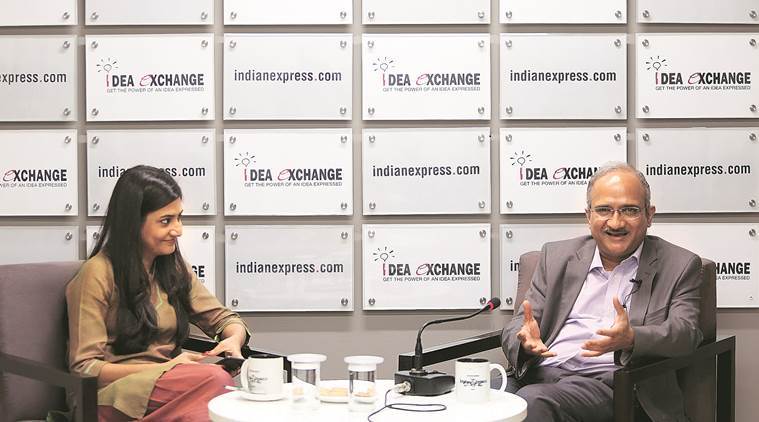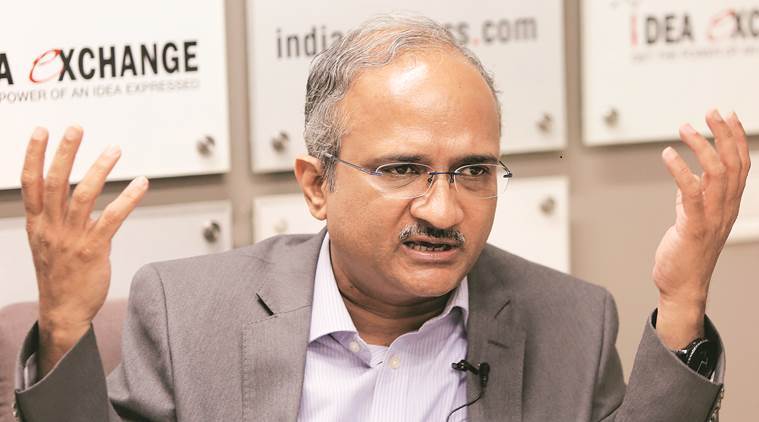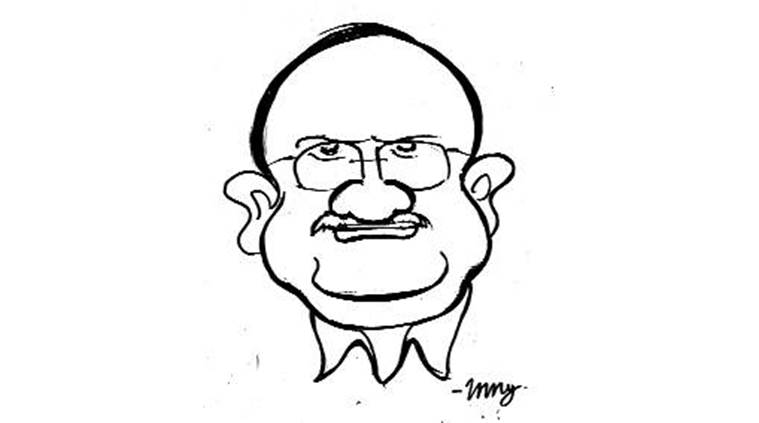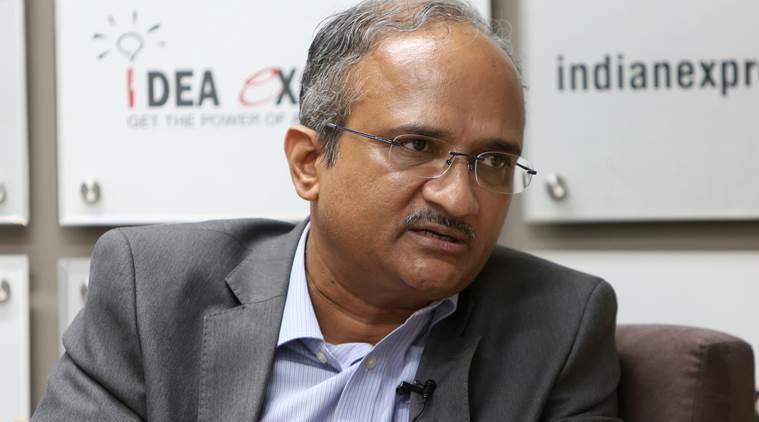 IIT-Delhi Director V Ramgopal Rao with Senior Assistant Editor Ritika Chopra in The Indian Express newsroom. (Express photo/Gajendra Yadav)
IIT-Delhi Director V Ramgopal Rao with Senior Assistant Editor Ritika Chopra in The Indian Express newsroom. (Express photo/Gajendra Yadav)
Ritika Chopra: How will the Institution of Eminence (IoE) status help IIT-Delhi?
We are quite excited that we have been considered for IoE; only two IITs have been considered. We have received an email from the secretary concerned on our fund requirements in the first year and what we want to accomplish with it. We are supposed to get Rs 200 crore every year for the next five years. We are preparing the budget for the first year.
Ritika Chopra: What did IIT-Delhi propose in terms of infrastructure and courses in the application?
Organisations such as QS Ranking mark institutions on five parameters. One is international students. We have a few international students but that doesn’t give us any points. We got zero in terms of international faculty. As the government has been giving us funds, we had no motivation to earn from student fees, which makes 5 per cent of our total budget. Unlike American universities, our intention was not to admit more students and earn money… Therefore, we never needed international students. The government never gave us the freedom, so we were never able to recruit foreign faculty. About a year ago, when the faculty situation became severe, we started five- year contract positions.
The third parameter was faculty-to- student ratio. We are not able to recruit enough faculty because we don’t get quality applications. In IIT, many of the faculty we recruit are people who have studied in the institution, gone to the US to complete their PhD, and then joined us. But in the last five-seven years, IIT students are not going abroad for higher education. Last year, only 5 per cent of our students did so. Our faculty pool is fast drying.
Therefore, on three parameters we get zero.
Two parameters for which we get some marks are research output and institution perception. For research output, IIT-D gets about 90 out of 100 marks. When it comes to research, we are ranked 39th in the world and are better than many American universities. Nobody thinks of India in terms of technology. So in terms of perception, we score 45 out of 100 marks.
So when we put all that together, we are ranked 172nd in the world right now. With IoE, the main goal is to enter the top 100. We need to start scoring in those parameters where we are getting zero. We have no choice but to admit foreign students. Our exams have become so tough now that I don’t think foreign students can qualify. To crack the entrance examination you need to cut yourself off for three years and prepare. The joint entrance examination (JEE) is being conducted in five other countries. Last year, we had a South Korean student. But that is because the student’s parents are in India. This year we don’t have any foreign student… At the BTech level, I don’t think we can change anything. But at the PhD level we can open up our programmes because there is more flexibility. Currently, IIT-Delhi has about 2,500 PhD students and we will increase that to 5,000….
Getting foreign faculty is difficult. Getting somebody from a top US school for the salary we offer will be tough. We’ll have to look at East European countries.
 “We are not able to recruit enough faculty because we don’t get quality applications. In IIT, many of the faculty we recruit are people who have studied in the institution, gone to the US to complete their PhD, and then joined us.”
“We are not able to recruit enough faculty because we don’t get quality applications. In IIT, many of the faculty we recruit are people who have studied in the institution, gone to the US to complete their PhD, and then joined us.”
Rakesh Sinha: Has the concern been conveyed to the government?
The Secretary of the Ministry of Human Resource Development is aware of the problems. Recruiting foreign faculty and internationalising our campuses are important if we plan to enter the top 100… I think perception is the most difficult to change and we don’t know how to address it. Maybe we have to organise branding exercises.
Ritika Chopra: Why are not many IIT graduates pursuing PhD abroad?
This is because of the availability of jobs. Now for a BTech or post-graduate student from IIT-Delhi, there are so many opportunities. They don’t look at the long term. The general perception is that you do a PhD if you want to become a professor, and that is not really true. Many high-tech industries recruit those with PhD but the salary package is not as high as offered to BTech students… But this is where the Prime Minister’s new research fellowship scheme comes into play. PhD candidates will be given Rs 75,000 a month. The fellowship programme is designed to attract BTech students to the PhD programme. Once they complete their PhD, we will try to recruit some of them as faculty. We set a target of 1,000 scholarships this year and Rs 2 lakh per year as contingency. This is almost equal to what an assistant professor gets paid in IIT. Although it’s an attractive scheme, we have been able to recruit only 130 people in the first round.
Ritika Chopra: Are you planning to rework the JEE Advanced format?
The Bachelor’s programme is no longer our focus anymore. In established IITs, only 40 per cent of our students pursue Bachelor’s degree. The rest are Master’s and PhD students. You cannot get any points by admitting more students at the undergraduate level. The JEE exam is tough. By 1 or 2 marks, the rank can go down by thousands. However tough you may set the exam, at the end of the day, with the kind of preparation that students come with… it’s difficult to make it even tougher. If you make it any simpler, students will score full marks. The JEE exam is an example of supply and demand. The exam is designed to eliminate people or to reject candidates, not to select them. So it is tricky and complicated.
We need more institutions which will offer good Bachelor’s programmes. That’s the solution to the problem. The established IITs should now become research-focused universities. When you think of Stanford, you don’t think of its Bachelor’s programmes. You think of the research. That’s the aura of MIT and Stanford. Although we have more post-graduate students, all our focus happens to be on the undergraduate programme. So we are hoping that at some point of time, the NITs will become as good as the IITs and start offering undergraduate programmes as good as ours. Then IITs can focus more on research and start dealing with society’s problems.
 “The Bachelor’s programme is no longer our focus anymore.”
“The Bachelor’s programme is no longer our focus anymore.”
Shradha Chettri: What is the student to teacher ratio in IIT-Delhi?
Currently the ratio is 1:18. You need at least 100 more faculty members to start scoring points in this parameter.
Ritika Chopra: When the government was pushing IITs to have non-residential students, it was resisted…
In South Delhi, we charge Rs 500 per month for hostels. But if you stay outside you need to pay at least Rs 8,000 per month. Many of our students cannot afford that. Starting next year, we are going to separate the accommodation process from the admission process.
Shubhajit Roy: If the IITs are good, why the need to improve perception?
It is because the media reports these international rankings in a prominent manner. Eventually the government reacts to public pressure. We don’t care. We know that we are good. In terms of undergraduate courses, the IITs are better than the best in the world. But the world also needs to say we are good. The ranking agencies are all private players, they are trying to make money out of that process. And the more serious one becomes about these rankings, the better for them… Many of these ranking organisations also run businesses that help in improving perception.
Ravish Tiwari: The IITs lack appreciation for humanities and social science students. Is there any plan to correct this attitude?
In India, technology institutions have not been able to showcase a lot of the work that has benefited the society. The reason is the fragmented way education is run in this country. You want to do engineering, we created the IITs. You want to do medicine, we created the AIIMS. You want to study management, we created the IIMs. Take the example of doubling farmers’ income by 2022. This requires multiple disciplines to come together.
Somebody has to work on Census, some on understanding the social aspects of it, and some at improving technologies. But this coming together is difficult because of our fragmented education system. We need to make our universities more comprehensive. At IIT-Delhi, we have started a School of Public Policy. Scientists and researchers can work on technological problems and put together a policy document that can help the country.
Ravish Tiwari: Has there been any change in industry-academia ties?
It is changing but slowly. This year, we received sponsored research funding worth about Rs 500 crore. Only 10 per cent of the amount has been given by the industry. This is because industries are not looking at long term like disruptive technologies. When I do research, I find it easier to work with Intel in the US or Portland, than the Bengaluru branch. The kind of work Intel is doing in Bengaluru is not next-generation technology. Many industries in the country are out of sync with academia… Unless industries collaborate with us more closely, we will not see light of the day. Because much of our research starts in the library and ends in the library. We have got the problem from the library and after publishing it goes back to the library.
However, some industries are beginning to look at the long term. When Manohar Parrikar was the defence minister, he asked the Defence Research and Development Organisation (DRDO) to work with the IITs. In the US, a lot of research happens with defence funding. In India, the defence sector had their own DRDO laboratories. Parrikar asked them to collaborate with the IITs and create Joint Advanced Technology Centres. He allotted Rs 200-300 crore. Now defence people have started centres in the IITs in Delhi, Bombay, Madras, and Jadavpur University.
For the first time, we are looking at agricultural problems. The sector was handled by the Indian Council for Agricultural Research (ICAR). Now IIT faculty members have been asked to collaborate with the ICAR. Last week, we signed an MoU with the All India Institute of Ayurveda. Nobody knows what Bhasma, used in Ayurveda, contains. When we analysed it, we found it contains arsenic, sulphur, magnesium etc. These are metals harmful to the body. But Ayurveda seems to work. So if proper procedures are not followed while making Ayurvedic drugs, a lot of issues can arise.
 “I don’t think marks scored in boards and the JEE have a direct relation.”
“I don’t think marks scored in boards and the JEE have a direct relation.”
Sandeep Singh: How do students with over 90 per cent in boards perform at the IITs?
I don’t think marks scored in boards and the JEE have a direct relation. The problem with the JEE is that if we make the paper easier, everybody will score 90 per cent. In the IITs, the internal examination is subjective, and students need to think in order to solve problems. While preparing for the JEE, students lose their thinking capacity. So once they are at the IIT, they need to do a lot of unlearning. Those who are able to unlearn and pick up quickly, they tend to do well. The top JEE rankers are definitely good.
The issue is when they get into the IIT, they are already very tired. They have worked for years, and now they want to relax. But it doesn’t work that way. The day they join, we start our courses, which are very competitive. Some lose motivation and give up. In many of our institutions, one in four-five students becomes a problem case. They are not able to clear exams.
Ritika Chopra: What role do coaching institutes play in the problem?
We keep doing things like changing examination patterns. We have also started the IIT Professor Assisted Learning (PAL) programme. We wanted students to focus on the basics and not indulge in pattern-matching in the JEE examination. So we recorded hundreds of lectures by IIT professors who set the question papers. They tell students which concepts to keep in mind while appearing for the exam. Because of the coaching centres, the kind of students we are getting in IITs are all of a particular profile. Why aren’t there enough girl students? Many parents don’t send girls to Kota for coaching… We now have almost a million hits on IIT PAL.
Shyamlal Yadav: Many senior IIT professors write articles in predatory journals. Is this being tackled?
Sometimes these predatory journals look genuine. They also get good people on their editorial boards. But once people become aware, they don’t publish their papers in these journals. Today, if I sit on a selection committee meeting, and if I see somebody has papers in 10 good journals, and two papers in predatory journals, I would enquire why they published their papers in those two. And it mostly happens due to ignorance. But if somebody is consistently doing that, then it’s a problem. We don’t get fooled by these actions.
Shubhajit Roy: If you were part of the panel that gave out the IoE tag, would you have chosen Jio Institute?
It depends on who presented the proposal, what was in it and other things. I don’t want to blame the committee. I would have definitely selected more institutions. I think three public institutions are too few. IIT Kharagpur and Madras should have been on the list. There should have been more public and private institutes. But there may be funding limitations. The proposed Rs 200 crore is a lot of money.
Shubhajit Roy: What is your view on Greenfield projects?
In India, private institutions have not picked up well. Look at the US, the best ones are private institutions. Autonomy is not something that you give only because of the IoE status. For an institution to function, autonomy is important. Why are the IITs doing better than universities? It’s because we have autonomy. If the IITs are restricted like other universities, they would collapse in 10 years… The government has been very generous to the IITs…
There are too many restrictions in the education sector. But that is due to private universities doing illegal things. These things happen because we have not put in place due processes as to who can start an university… Now certain measure have been put in place. As a result, good universities are also suffering.